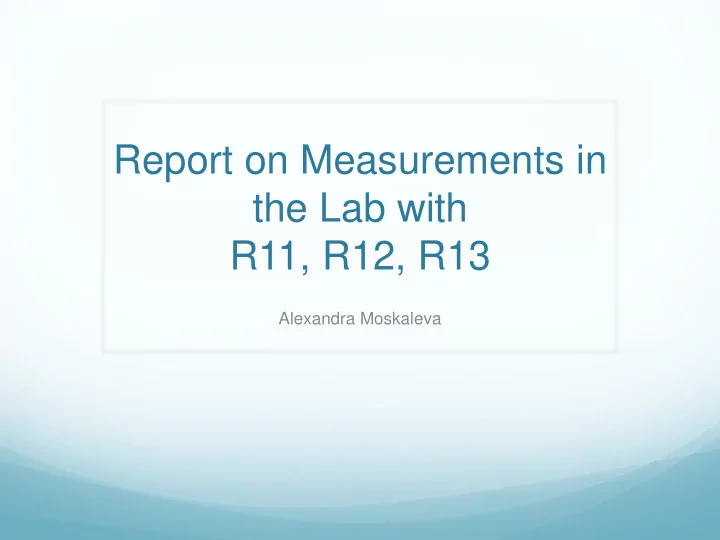

Report on Measurements in the Lab with R11, R12, R13 Alexandra Moskaleva
What is a resistive chamber? Non-resistive Micromegas Resistive Micromegas (R11, R12, R13)
Resistive Characteristics CHAMBER R11 R12 R13 Resistance to 15 45 20 Ground (MΩ) Resistance along strip 2 5 0.5 (MΩ/cm)
Types of Measurements Properties Gain Transparency Response to cosmics Charge-up High rate behavior Tools 5 keV 55 Fe source 8 keV X-ray gun at various rates 120 GeV pion test beam
Gain & Transparency Measurement – Set up Gas out Protective cover with holes Read out connectors 55 Fe tablet HV Drift HV Mesh Gas in
18 mm Each read-out connector connected to 72 strips Covers a cross-section of 18 mm Strips that are not read out are grounded
Example Spectrum 55 Fe (5.9 keV) Peak Ar escape peak (3 keV lower)
Peak of 55 Fe taken in arbitrary units from spectrum Rate, counts, live time, start time also displayed Converted to gain via calibration signal Calibration pulse = 10 4 gain Gain measurements taken for: R11, 93% Ar 7% CO 2 R12, 93% Ar 7% CO 2 R12, 85% Ar 15% CO 2 R13, 93% Ar 7% CO 2 R13, 85% Ar 15% CO 2
Gain Measurements - Results
Transparency Measurements Transparency = (# of e – that make it to the amplification field) (Total # of e – produced) Transparency measurements taken for: R12, 93% Ar 7% CO 2 R12, 85% Ar 15% CO 2 R13, 93% Ar 7% CO 2 R13, 85% Ar 15% CO 2
Transparency Measurements – Set up Measured gain as a function of E amplification /E drift Kept V mesh constant Varied V drift E=V/d, where V is the voltage difference and d is the distance E drift = (V mesh -V drift )/d ≈ 300V/5mm ≈ 600 V/cm E amplification = (V mesh -V ground )/d ≈ 500V/.128mm ≈ 40 kV/cm Normalized highest gain = 1
Cosmic Measurements – Set up Stacked R11, R12, R13 with 15mm spacers Used R11 and R13 to trigger, R12 to acquire
R11 HV Mesh top Top HV Drift R12 HV Mesh middle MCA R13 HV Mesh bottom Bottom
Cosmics – Logic Top Threshold NIM Gate TTL for MCA Bottom Threshold
Cosmics - Results
Cosmic most probable value 55 Fe (5.9 keV) Peak 55 Fe produces 225 e – in drift region, with a peak ≈ 420 Cosmics produce a peak ≈ 100 (a factor of ¼) Therefore, cosmics produce ≈ 50 e – in 5mm drift region Agrees with 90 e – /cm for Ar and for CO 2
Charge Up – Theory Charge is deposited on the detector in <2mm radius for every photon Due to dispersion in electron avalanche Some charge deposits on resistive strips Runs to ground due to relatively low resistance Some charge deposits on insulative area Cannot drain away as quickly builds up an excess of negative charge No longer at ground
≈2mm Charge is deposited on resistive and insulative strips Footprint of roughly 2mm in diameter
Charge leaks away through the resistive strips Takes much longer to leak away charge from insulative portion If the rate of deposition >> rate of discharge, then there is a buildup of charge E amplification decreases
Charge deposited per second: Rate = 200 Hz (200 Hz) × (225 e – per photon) × (10 4 gain) × (1.6 × 10 -19 ) ≈ .06 nA Rate = 20k Hz (20000 Hz) × (225 e – per photon) × (10 4 gain) × (1.6 × 10 -19 ) ≈ 6 nA Δ Voltage (very rough estimations of what to expect) In resistor Low rate: V = IR = .06 nA × 10 8 Ω = .006 V High rate: V = IR = 6 nA × 10 8 Ω = .6 V In insulator Low rate: V = IR = .06 nA × 10 10 Ω = .6 V High rate: V = IR = 6 nA × 10 10 Ω = 60 V
Δgain≈1600 Gain decreases due to decrease in E mesh
Δgain≈2000 Δgain≈1000
Δgain≈5000 Δvoltage≈15V
Conclusions Gain All chambers reach gain of ≈30k With 93:7 Ar:CO 2, the chambers can be operated at a HV 40V lower than for 85:15 Ar:CO 2 R12 has highest gain, R11 has lowest Transparency For good transparency, E amp /E drift > 80 85:15 Ar:CO 2 rises faster, but shows similar behavior to 93:7 Ar:CO 2 in steady state Cosmics Cosmic measurements show good results (Landau curve) with most probable value showing creation of 50 e – in 5mm drift region, as expected Charge up Charge up is observed As function of rate (reducing gain by 10% at 200 Hz, 20% at 20 kHz)
This has been an amazing summer! Thank you to everyone who has guided me in this experience!!!
Recommend
More recommend